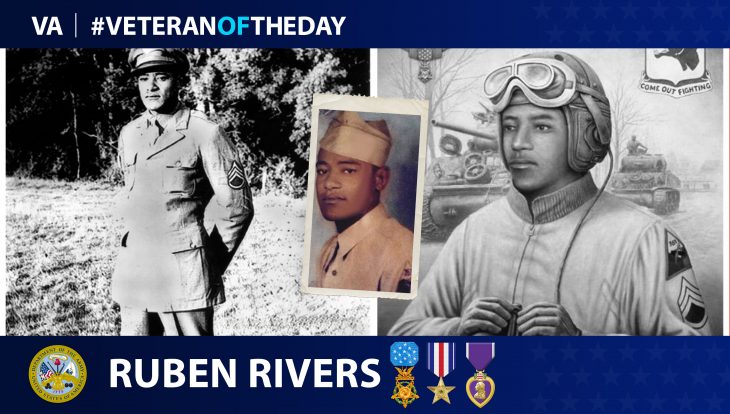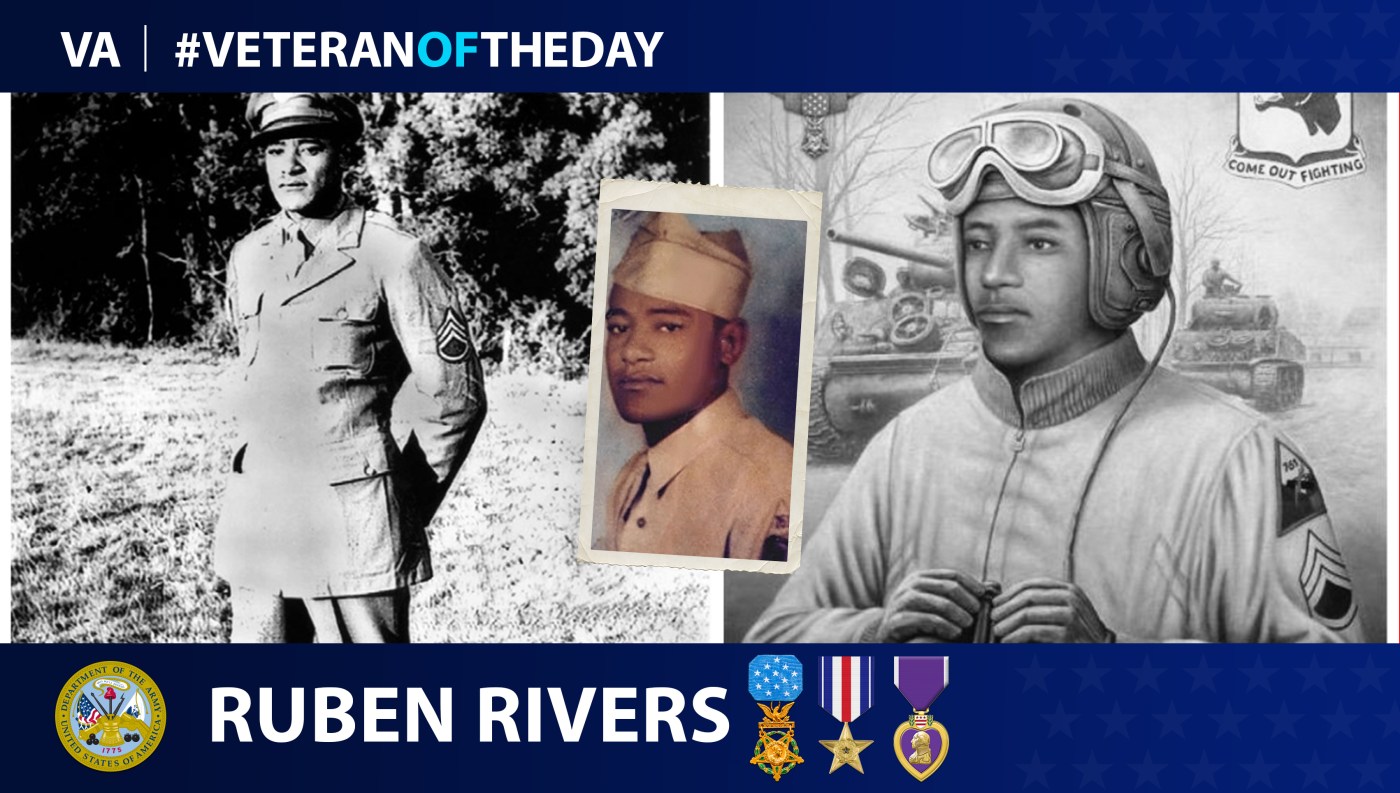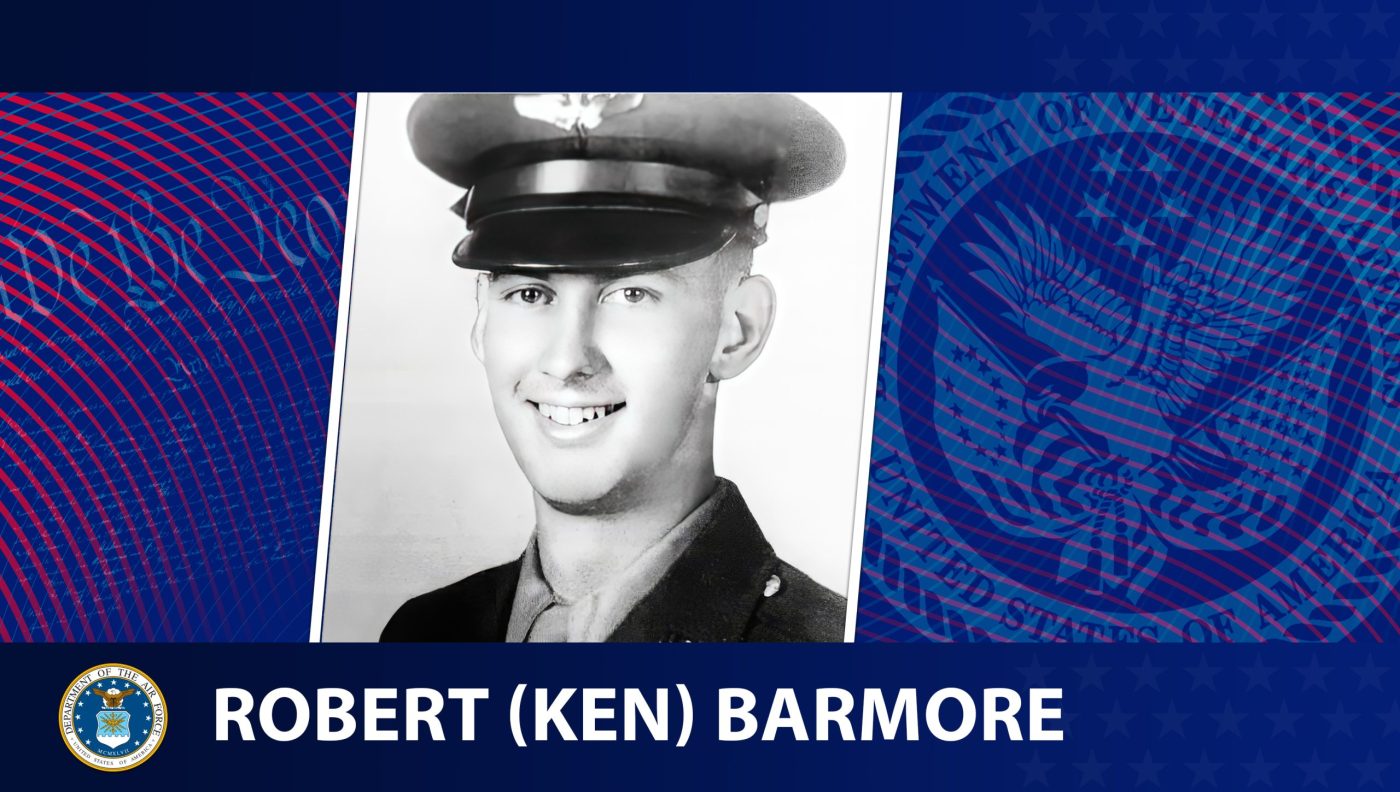
During National Black History Month, today’s #VeteranOfTheDay is Army Veteran Ruben Rivers, who received a Medal of Honor for actions in WWII.
Ruben Rivers was born in 1918 in Tecumseh, Oklahoma. He lived nearby and worked on a farm where he lived with his parents and 11 siblings. After Rivers graduated from high school, he had a job with a railroad before he enlisted in the Army in 1942.
Rivers trained with a tank battalion at Camp Hood, Texas, now known as Fort Hood. Due to segregation in the military at the time, he served in an all-black unit. This unit formed Company A, 761st Tank Battalion, later known as the “Black Panthers.” The 761st was one of the best units in stateside service. Gen. Ben Lear reviewed the unit and declared them combat ready. At this point, Rivers had made the rank of staff sergeant and commanded a tank platoon upon deployment.
The unit arrived in England in 1944. Upon hearing excellent reviews, Gen. George S. Patton requested the unit for the Third Army. Rivers and the rest of his battalion transferred to France in October 1944, where they joined the 26th Infantry Division.
In early November 1944, the 761st advanced toward the Siegfried Line as part of the Saar Campaign. While attacking with infantry, Rivers and his tank encountered intense enemy fire. Rivers quickly dismounted from his lead tank to help infantry direct their fire, which put him at great risk. He also manually cleared a roadblock that was holding the tanks up.
Less than two weeks later, Rivers was again in heavy combat that lasted several days. While advancing on German positions in Guebling, France, a mine hit and disabled Rivers’ tank. Despite severe wounds, Rivers refused evacuation or medical treatment. Instead, he took command of a different tank within the platoon, which was under Rivers’ overall command. The platoon suffered considerable losses, but Rivers and his tank pressed on. In these actions, Rivers and his men helped secure the village of Guebling.
The unit continued and encountered decidedly stiff enemy anti-tank fire. Despite being ordered to retreat, Rivers told his commander he had spotted the German tanks that had been firing on the advancing Americans. Rivers began to fire at the Germans, which allowed the men of his unit to retreat successfully. Rivers was killed in action Nov. 19, 1944, as the Germans destroyed his tank.
Despite his commander’s recommendation for a Medal of Honor, he did not receive it due to his race. He posthumously received a Medal of Honor in 1997, 53 years after his death. In addition, Rivers received a Silver Star and Purple Heart. He is buried in Lorraine American Cemetery in France.
We honor his service.
Nominate a Veteran for #VeteranOfTheDay
Do you want to light up the face of a special Veteran? Have you been wondering how to tell your Veteran they are special to you? VA’s #VeteranOfTheDay social media feature is an opportunity to highlight your Veteran and his/her service.
It’s easy to nominate a Veteran. Visit our blog post about nominating to learn how to create the best submission.
Contributors
Writer: Michael Veronda
Editor: Julia Pack and Kristen Whitehurst
Fact checker: Carl Wesseln
Graphic artist: Courtney Carr
Topics in this story
More Stories
This week’s Honoring Veterans Spotlight honors the service of Army Veteran Scotty Hasting, who served in Afghanistan.
This week’s Honoring Veterans Spotlight honors the service of Army Veteran Roy Sheldon, who served in 97th General Hospital in Frankfurt, Germany.
This week’s Honoring Veterans Spotlight honors the service of Air Force Veteran Robert (Ken) Barmore, who served in Bennettsville Primary Flight School, Italy and Romania.







My Dad’s BFF, as he told me the WWII stories in France. He had his own historical moments, as the “unknown soldier,” a Sargeant, who got assistance for his unit, cuz, he spoke Italian, as a child, living in integrated Brooklyn, n got fuel n provisions, cuz, their “supply line was “cutoff,” n his men were cold n starving.
He went n got them, help. I still eat “Hershey bars,” cuz, my Dad always ate one from a little POW, who took his out of his pocket, escaping Auschwitz, when his unit, got, there first… That part of “history,” never fully told, to a country, getting “war weary.” I wonder, if I could get my Dad, the actual honor he deserved, for his service, n injuries… Cuz, without him, I could have never made the US Navy, as a Corpsman, my career. He was a “Black Liberator,” that I am very proud of him, he was afraid to tell, cuz, the Captain in charge, had severely threatened to court-martial him, n he leaved in fear n resentment, by, he loved his men n country… I know this man n Jackie Robinson, as though they were “long-lost,” Uncles. My Dad got hit with a gun turret, n he was sent to Germany, for head injuries. He could piece together, “parts,” until Alzheimer’s Disease, unlocked the whole story, n he felt “safe,” to tell his out ranking daughter, his truths… He would tell me, “You do not want those bad thoughts, in your head,” as a child, as well, until I came home, with my own, n he told me his, in order to “save his daughter!” In his last few years, I learned of these men in the “761st,” as adult bedtime stories, as we shared, chocolate bars, n Cokes, n an occasional celebratory small glass of wine from France… I miss Dad. I would like to finish the parts, untold. Rest in Peace, Sgt. Ralph N. Jackson.
Thank you, Staff Sgt, Ruben Rivers, you were a great friend in my Dad’s eyes, n as you fought together…
He actually cried, telling your story. He never cried, until he told his story about the men of “The 761st!”
He truly loved n respected these guys! As I respect them, too! Rest in Peace! Thank you!
It’s just a shame the black heroes of WWI and WWII
did not get the recognition they deserved at the time.
America we have to be United and end racism or
The country will go backwards instead of forward.
We honor the service of Ruben Rivers.